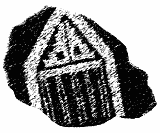Story 14—
Siuuhu's Journey Back

When the people saw the sticks, they agreed it was all right for them to go to these (upper) people and make war on them. The four sticks meant that when four days were up, they must be ready to go and make war. They must prepare the food to use as they go along.
Siuuhu spoke to them and said that his white people are out of this question. He meant that the white people were not against him.[5]
They asked one man to go over the [underworld] land and find out what it was like toward the east. He went and found four places where there was good water, so they could stop at those places to drink.
When the four days were up, the people started to come, not only the men but also the women and small children, and so their journey was started. In their carrying baskets they took their fighting weapons such as bows and arrows and everything they must fight with. With the power of Earth Doctor, these carrying baskets walked by themselves. Earth Doctor spoke to Siuuhu and told him, "If you get to a place where it is impossible, you must remember me and I'll help you out."
When they started their journey, they had a broad road. When Earth Doctor saw this road, he sang:
Toward the morning
Bright roads have been made.
And bright carrying baskets
Are being set.
They went on and came to the first place where there was good water to drink, and they camped there. They started and came to the next water hole and camped there, and the third and camped there, and the fourth water hole and camped there. From this place they sent the same man who had found the water holes, and he came out over the edge of the earth and was looking out into the west.
He returned back, and when he got to the people he said, "When I looked over the earth, I saw many wahpo ki (houses, called "ki " now),[a] and it seems that they extend right across to the setting of the sun."
He told that among these [upper] people were old and young, and men and women, who talked wisely and bravely, so it seemed impossible [to defeat them], and [he said,] "If we go there, the only thing we can do is take a shot at those people and go back home." But this [same


We are going to kill them.
We are going to kill them.
It sounds like we
Are going to burn them up.
And another song:
We are going to get them,
We are going to get them.
It sounds like we
Are going to like it.
[a] Wa 'aki (sing., pl. wa:paki ), 'great-house'; ki: , 'house' (of present-day people). Notwithstanding the first emergence in Europe (below), this seems to be a vision of the Hohokam great-houses soon to be conquered in today's central Arizona.
[b] Wu:skam[*] , 'emerger', 'something-that-came-out'. Later in the mythology, Hayden spells this word as "Wooshkum." I retain his spellings.
[c] Huhugkam , 'finished-ones', 'those-that-are-ended'.
So they kept coming this way, and as they were coming over the top [edge] of the earth, they sang:
The earth is grey in which
I am coming out
And the earth is getting damp (means that they were
coming out with clouds).
So this is the way the songs were sung and is why they call them wooshkum, that is, "coming out":
A song with unknown [forgotten

words that speaks of mountains coming out
someplace.
Another song, not understood, that speaks of the
people coming along some mountains.
When they first came out, they settled way back east, farther than the [Atlantic] ocean. Then they sang:
I'm coming out of the east
We are getting closer to the
People we are mad at (vay pay shut[d] —Hohokam).
Another song:
I'm going now to the other side of
The setting of the sun.
From the place where they last camped [somewhere in Europe], they were getting ready to see what was
[d] Vipisat[*] , 'great-grandparents', 'great-grandchildren', an alternative name for the Hohokam, that is, for the prehistoric dwellers of Pima-Papago country.
going on over here. They put one of their medicine men to look as far as the ocean was and find out what was there, and they sang:
You have done a sad thing to me
You have fixed the earth
And in this earth
You have put me down.
And I'm looking ahead
And I'm seeking everything right.
He was sitting. Then he arose and was standing, and he sang:
You have done a sad thing to me
You have fixed the earth
And in that earth
You have made me stand.
And in front of me
I have learned the mountains.